-
30-Year-old Argentinian woman whose HIV disappeared gives hope for AIDS cure

The ndtv reported according to Bloomberg, researchers said that all signs of HIV have disappeared in a young woman who was diagnosed with the virus that causes AIDS in 2013, raising hopes that she may be one of a handful of people worldwide who has permanently fought off the infection.
The 30-year-old mother, originally from the city of Esperanza in Argentina, has the clinical features of an HIV "elite controller," meaning her infection has been undetectable for years. Researchers said in a studyslated for publication in the Annals of Internal Medicine, it didn't reemerge even after she stopped taking powerful drugs to treat it, which is what normally happens.
 Argentina-Buenos Aires/Pixabay
Argentina-Buenos Aires/PixabayThe virus also doesn't appear to have integrated into her DNA, creating what is known as a provirus, and extensive testing failed to turn it up anywhere. They said, it's possible that she has experienced what is known as a "sterilizing cure," meaning she is no longer carrying a replicating form of the virus.
No answers
How it happened is a mystery. At least two other HIV patients have also been deemed cured, but both underwent extensive treatment for blood cancer that involved stem cell transplants. The researchers offered no answers as to how the young mother eradicated the virus, but her existence suggests it is possible.
Read more: Prince Charles to open AstraZeneca research and development facility on Tuesday
The virus "was not detected in an elite controller despite analysis of massive numbers of cells from blood and tissues, suggesting that this patient may have naturally achieved a sterilizing cure of HIV-1 infection," said researchers led by Xu Yu at Boston's Ragon Institute and Natalia Laufer from the Institute of Biomedical Research in Retrovirus and AIDS in Buenos Aires. "These observations raise the possibility that a sterilizing cure may be an extremely rare but possible outcome of HIV-1 infection."
Doctors have tried unsuccessfully for decades to eradicate the virus within patients. While combination drug therapies can suppress it so it's no longer detectable, the vast majority of patients still have a reservoir that's reactivated after treatment stops. Finding another person who's virus-free raises the hope for other ways to wipe out the reservoir and cure more people.
Read more: Australian researchers embark on a voyage to unlock the secrets of earthquakes
It's possible the patient's initial immune response to HIV led to an abortive infection or that her immune system became better at recognizing and destroying it over time, leaving only remnants of HIV behind, said co-author Sharon Lewin, director of the Peter Doherty Institute for Infection and Immunity at the University of Melbourne.
Ads by
"People are excited about it because it's sort of another pathway to a cure," Lewin said in an interview Wednesday. "You can eventually get rid of intact virus and you're just left with these footprints of the virus."
About 1% of Caucasian people living with HIV develop control over the infection. It's possible a subset may be cured, meaning they no longer have any replication-competent HIV, said Lewin, who is studying the genetic details of what constitutes a cure.
'Berlin Patient'
The researchers said the Argentinian woman, whose partner died of AIDS in July 2017, resembles the "Berlin patient." That man, Timothy Brown, developed a probable sterilizing cure of HIV after undergoing a stem cell transplant to treat acute myeloid leukemia almost 15 years ago.
Read more: Internet users can be manipulated into sharing private information
Since the beginning of the AIDS epidemic, almost 80 million people have been infected with HIV and 36.3 million people have died from complications of the viral illness. Worldwide, an estimated 37.7 million people were living with HIV in 2020.
Progress against AIDS over the past two decades has inspired a commitment by United Nations member states to end the epidemic by 2030. The number of people newly infected with HIV fell to 1.5 million worldwide in 2020, from 3 million in 1997.
Source: ndtv
You May Also Like
Popular Posts
Caricature
BENEFIT Sponsors BuildHer...
- April 23, 2025
BENEFIT, the Kingdom’s innovator and leading company in Fintech and electronic financial transactions service, has sponsored the BuildHer CityHack 2025 Hackathon, a two-day event spearheaded by the College of Engineering and Technology at the Royal University for Women (RUW).
Aimed at secondary school students, the event brought together a distinguished group of academic professionals and technology experts to mentor and inspire young participants.
More than 100 high school students from across the Kingdom of Bahrain took part in the hackathon, which featured an intensive programme of training workshops and hands-on sessions. These activities were tailored to enhance participants’ critical thinking, collaborative problem-solving, and team-building capabilities, while also encouraging the development of practical and sustainable solutions to contemporary challenges using modern technological tools.
BENEFIT’s Chief Executive Mr. Abdulwahed AlJanahi, commented: “Our support for this educational hackathon reflects our long-term strategic vision to nurture the talents of emerging national youth and empower the next generation of accomplished female leaders in technology. By fostering creativity and innovation, we aim to contribute meaningfully to Bahrain’s comprehensive development goals and align with the aspirations outlined in the Kingdom’s Vision 2030—an ambition in which BENEFIT plays a central role.”
Professor Riyadh Yousif Hamzah, President of the Royal University for Women, commented: “This initiative reflects our commitment to advancing women in STEM fields. We're cultivating a generation of creative, solution-driven female leaders who will drive national development. Our partnership with BENEFIT exemplifies the powerful synergy between academia and private sector in supporting educational innovation.”
Hanan Abdulla Hasan, Senior Manager, PR & Communication at BENEFIT, said: “We are honoured to collaborate with RUW in supporting this remarkable technology-focused event. It highlights our commitment to social responsibility, and our ongoing efforts to enhance the digital and innovation capabilities of young Bahraini women and foster their ability to harness technological tools in the service of a smarter, more sustainable future.”
For his part, Dr. Humam ElAgha, Acting Dean of the College of Engineering and Technology at the University, said: “BuildHer CityHack 2025 embodies our hands-on approach to education. By tackling real-world problems through creative thinking and sustainable solutions, we're preparing women to thrive in the knowledge economy – a cornerstone of the University's vision.”
opinion
Report
ads
Newsletter
Subscribe to our mailing list to get the new updates!






















